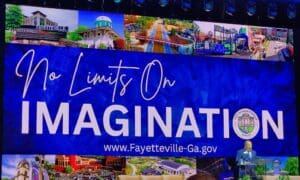If you want to open a pawn shop in Fayetteville, you may have to go to the city dump and sewer plant.
The Fayetteville City Council at the June 17 meeting heard the first reading of an ordinance amendment that would confine pawn shops to industrial-zoned areas of the city and another that would help attract restaurants to the historic downtown area.
Council members heard the first reading of an amendment to the pawn shop ordinance that would have those businesses located in the M-1 (Light Industrial) and M-2 (Heavy Industrial) zoning districts. Pawn shops are currently allowed in C-3 (Highway Commercial) districts.
Areas zoned M-1 and M-2 include Robinson Drive off Ga. Highway 54 East, Industrial Way off South Jeff Davis, portions of Roberts Road off Ga. Highway 85 North and Georgia Avenue West, also off Hwy. 85. But, by far, the largest land mass carrying industrial zoning is on the west side of First Manassas Mile near the old landfill and the Fayetteville Wastewater Treatment Plant.
Senior Planner Linwood Robinson said that while there are currently no pawn shops operating in the city, there have been several recent inquiries.
Robinson said that, as a housekeeping matter and an attempt to make sure pawn shops approved for operation in Fayetteville are placed in appropriate zoning classifications, city staff, the city attorney and Planning & Zoning Commission have conducted research on community impact and which zoning district is best suited for the placement of pawn shops.
Council at the meeting also heard the first reading of a proposed ordinance amendment that would exempt impact fees and sewer proportionate fees for historic commercial properties around the Courthouse Square. The measure is aimed at the continuing effort to attract restaurants to the downtown area.
Main Street Director Brian Wismer said the idea behind the proposal is to create incentives that will encourage restaurant uses in historic commercial properties in the downtown square. An increased presence of restaurants will, in turn, boost the local economy, create additional income for the city, and further the city’s goal to create a more active and lively downtown area, Wismer said.












Leave a Comment
You must be logged in to post a comment.